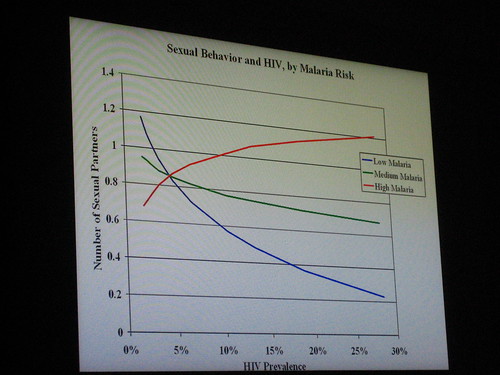Emily Oster is a remarkable economist at the University of Chicago. Like some other UChicago economists, she’s interested in using economic tools to show you unexpected truths.
Specifically, Oster is interested in explaining AIDS in Africa. She’s outlines four things we “know” about AIDS, and then goes on to explain why they’re wrong:
– There are 25 million people in Africa with AIDS
– If you decrease poverty, you decrease AIDS
– Uganda’s ABC campaign is a (unique) success story
– US funding should be focused on education
Thought of in economic terms, AIDS requires us to think of costs, specifically the cost of sex. In countries with high degrees of AIDS infection, the cost of a new sexual partner can be very high. In Botswana, with 30% adult infection rates, the cost of one new sexual partner is a 3% increase in chance of death. In the US gay community, the cost of sex had a very clear effect on sexual behavior – during the late 1980s, rates of sex with new partners dropped from 85% to 55% in some communities. But in Africa, there’s no similar drop in extramarital or premarital sex. Why?
Oster argues that health is an investment. If you’re expecting to live a good, long time, you might be more inclined to make health investments than if you expect to die soon. If your life expectancy is only 40-50 years due to environmental factors, you might be more willing to take this 3% risk than a gay man in America who otherwise expects to live almost 80 years.
To test this effect, Oster looked at sexual behavior rates in countries that had high, low and medium levels of malaria. In countries with low malaria, there’s a very strong correlation between prevalence of AIDS and change in behavior – in countries with high malaria, there’s no correlation, or in fact, an opposite effect. There’a similar correlation with maternal health and child mortality. This suggests that if you want to combat AIDS, you also need to deal with malaria, internal air quality and maternal health.
So there goes the benefits of education alone – you may need to change underlying life expectancy factors for education to be effective. How about the question of how many people in Africa have AIDS? Well, there are no good estimates of HIV in the general African population until 2003 – before that, we’ve got figures in STD patients, IV drug users and, occasionally, pregnant women. We end up with radically inaccurate figures – the estimates of mortality based on these figures versus estimates based on actual mortality data are huge. Prevalence is actually significantly lower than we previously thought.
How about poverty and AIDS? We know that trade increases economic development in Africa. But it turns out that increasing exports is correlated with higher rates of AIDS. If you double trade, you quadruple AIDS – this makes some sense, as we known that migrants and truck drivers are much more likely to be affected. This doesn’t mean we’d want to discourage trade, but it does mean we need to think about addressing AIDS as we increase trade through instruments like AGOA (African Growth and Opportunity Act.)
Oster shows an absolutely amazing graph – a correlation between coffee prices and HIV in Uganda. As HIV drops in Uganda in the early 1990s, coffee prices also fall sharply. So it may not be the abstinence and education campaign in Uganda – there’s a strong likelihood that the effect is more closely correlated to reduced trade.
This is an amazing, provocative talk – Chris Anderson acknowledges that some people may be upset or provoked by this research. But it’s very clear to me that Oster is asking incredibly important and difficult questions and doing so with statistical rigor.

I’ve worked in the field of HIV for twenty years and none of Oster’s four myths are commonly believed among the HIV professionals I know. I wonder whose myths they really are. Oster’s?
Pingback: …My heart’s in Accra » Twelve great talks to watch, and no excuses for being bored. (Or boring.)
Pingback: …My heart’s in Accra » Stories I’m (not) following this week
Comments are closed.